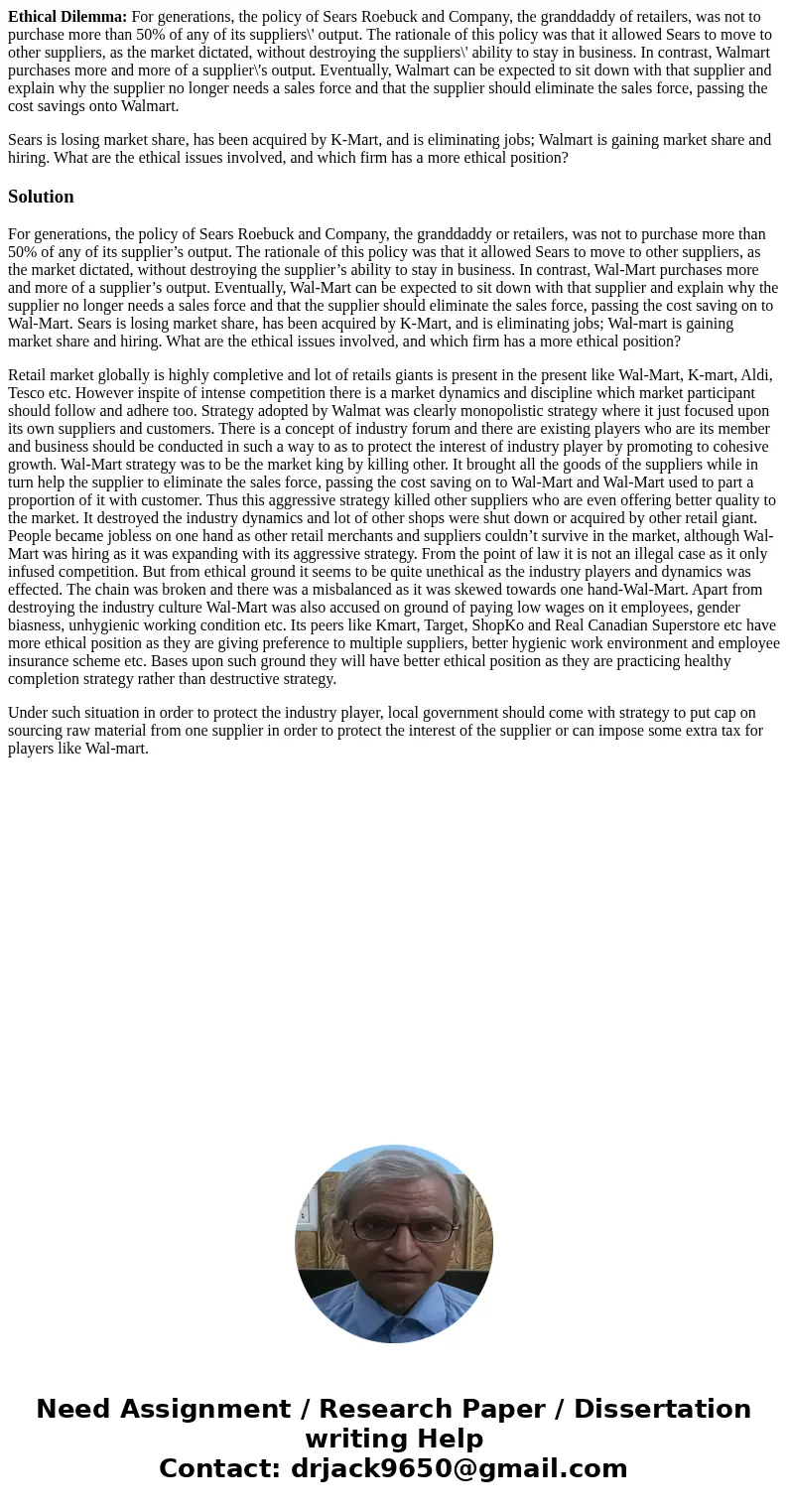Ethical Dilemma For generations the policy of Sears Roebuck
Ethical Dilemma: For generations, the policy of Sears Roebuck and Company, the granddaddy of retailers, was not to purchase more than 50% of any of its suppliers\' output. The rationale of this policy was that it allowed Sears to move to other suppliers, as the market dictated, without destroying the suppliers\' ability to stay in business. In contrast, Walmart purchases more and more of a supplier\'s output. Eventually, Walmart can be expected to sit down with that supplier and explain why the supplier no longer needs a sales force and that the supplier should eliminate the sales force, passing the cost savings onto Walmart.
Sears is losing market share, has been acquired by K-Mart, and is eliminating jobs; Walmart is gaining market share and hiring. What are the ethical issues involved, and which firm has a more ethical position?
Solution
For generations, the policy of Sears Roebuck and Company, the granddaddy or retailers, was not to purchase more than 50% of any of its supplier’s output. The rationale of this policy was that it allowed Sears to move to other suppliers, as the market dictated, without destroying the supplier’s ability to stay in business. In contrast, Wal-Mart purchases more and more of a supplier’s output. Eventually, Wal-Mart can be expected to sit down with that supplier and explain why the supplier no longer needs a sales force and that the supplier should eliminate the sales force, passing the cost saving on to Wal-Mart. Sears is losing market share, has been acquired by K-Mart, and is eliminating jobs; Wal-mart is gaining market share and hiring. What are the ethical issues involved, and which firm has a more ethical position?
Retail market globally is highly completive and lot of retails giants is present in the present like Wal-Mart, K-mart, Aldi, Tesco etc. However inspite of intense competition there is a market dynamics and discipline which market participant should follow and adhere too. Strategy adopted by Walmat was clearly monopolistic strategy where it just focused upon its own suppliers and customers. There is a concept of industry forum and there are existing players who are its member and business should be conducted in such a way to as to protect the interest of industry player by promoting to cohesive growth. Wal-Mart strategy was to be the market king by killing other. It brought all the goods of the suppliers while in turn help the supplier to eliminate the sales force, passing the cost saving on to Wal-Mart and Wal-Mart used to part a proportion of it with customer. Thus this aggressive strategy killed other suppliers who are even offering better quality to the market. It destroyed the industry dynamics and lot of other shops were shut down or acquired by other retail giant. People became jobless on one hand as other retail merchants and suppliers couldn’t survive in the market, although Wal-Mart was hiring as it was expanding with its aggressive strategy. From the point of law it is not an illegal case as it only infused competition. But from ethical ground it seems to be quite unethical as the industry players and dynamics was effected. The chain was broken and there was a misbalanced as it was skewed towards one hand-Wal-Mart. Apart from destroying the industry culture Wal-Mart was also accused on ground of paying low wages on it employees, gender biasness, unhygienic working condition etc. Its peers like Kmart, Target, ShopKo and Real Canadian Superstore etc have more ethical position as they are giving preference to multiple suppliers, better hygienic work environment and employee insurance scheme etc. Bases upon such ground they will have better ethical position as they are practicing healthy completion strategy rather than destructive strategy.
Under such situation in order to protect the industry player, local government should come with strategy to put cap on sourcing raw material from one supplier in order to protect the interest of the supplier or can impose some extra tax for players like Wal-mart.

 Homework Sourse
Homework Sourse